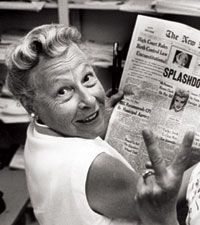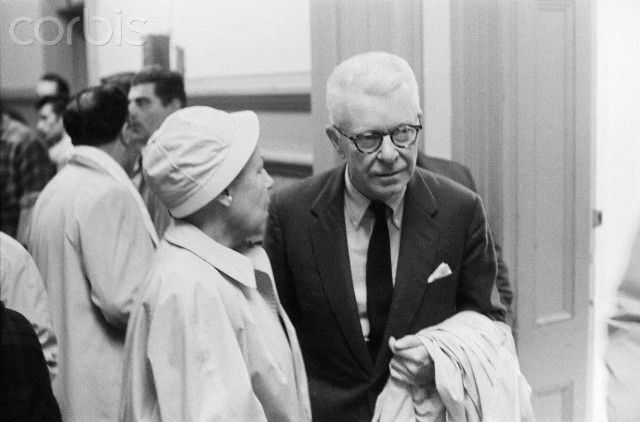 In November 1961 Estelle Griswold (left) partnered with Dr. C. Lee Buxton (of Yale's Medical School) to open a small clinic that would provide contraceptives. Mrs. Griswold was also the Executive Director of the Planned Parenthood League of Connecticut. For two decades Planned Parenthood in CT worked mostly as a 'shuttle service' taking clients to states where contraception was legal (though in CT married women with private physicians might be able to get birth control but poor women--or women without connections--were SOL). Anyway, at their new clinic, they counseled married couples in regards to contraception and prescribed whatever would work best for that particular woman. This all sounds very normal today, almost boring. But then? It was revolutionary.
In November 1961 Estelle Griswold (left) partnered with Dr. C. Lee Buxton (of Yale's Medical School) to open a small clinic that would provide contraceptives. Mrs. Griswold was also the Executive Director of the Planned Parenthood League of Connecticut. For two decades Planned Parenthood in CT worked mostly as a 'shuttle service' taking clients to states where contraception was legal (though in CT married women with private physicians might be able to get birth control but poor women--or women without connections--were SOL). Anyway, at their new clinic, they counseled married couples in regards to contraception and prescribed whatever would work best for that particular woman. This all sounds very normal today, almost boring. But then? It was revolutionary. Connecticut had a law on the books, one that came about a result of Anthony Comstock, which said:
"Any person who uses any drug, medicinal article or instrument for the purpose of preventing conception shall be fined not less than fifty dollars or imprisoned not less than sixty days nor more than one year or be both fined and imprisoned."Ten days after their clinic was opened, Mrs. Griswold and Dr. Buxton were arrested, found guilty, and fined ($100 each). The case went to the Supreme Court (there were previous cases attempting to challenge the law but they did not make it to this point).
"Any person who assists, abets, counsels, causes, hires or commands another to commit any offense may be prosecuted and punished as if he were the principal offender."

In its opinion, delivered by Justice Douglas, the Court said (in part):
We have had many controversies over these penumbral rights of "privacy and repose." These cases bear witness that the right of privacy which presses for recognition here is a legitimate one.The ruling was delivered 46 years ago today on June 7th, 1965.
The present case, then, concerns a relationship lying within the zone of privacy created by several fundamental constitutional guarantees. And it concerns a law which, in forbidding the use of contraceptives rather than regulating their manufacture or sale, seeks to achieve its goals by means having a maximum destructive impact upon that relationship. Such a law cannot stand in light of the familiar principle, so often applied by this Court, that a "governmental purpose to control or prevent activities constitutionally subject to state regulation may not be achieved by means which sweep unnecessarily broadly and thereby invade the area of protected freedoms." . Would we allow the police to search the sacred precincts of marital bedrooms for telltale signs of the use of contraceptives? The very idea is repulsive to the notions of privacy surrounding the marriage relationship.
We deal with a right of privacy older than the Bill of Rights - older than our political parties, older than our school system. Marriage is a coming together for better or for worse, hopefully enduring, and intimate to the degree of being sacred. It is an association that promotes a way of life, not causes; a harmony in living, not political faiths; a bilateral loyalty, not commercial or social projects. Yet it is an association for as noble a purpose as any involved in our prior decisions.
Reversed.
The case of Griswold v. Connecticut has gone on to influence many other cases, notably: 1972's Eisenstadt v. Baird (which extended the right of contraception to unmarried women), 1973's Roe v. Wade and 2003's Lawrence v. Texas (which struck down Texas's sodomy laws).
Mrs. Estelle Griswold's 111th birthday would be tomorrow. She passed away in 1981.




Shakesville is run as a safe space. First-time commenters: Please read Shakesville's Commenting Policy and Feminism 101 Section before commenting. We also do lots of in-thread moderation, so we ask that everyone read the entirety of any thread before commenting, to ensure compliance with any in-thread moderation. Thank you.
blog comments powered by Disqus